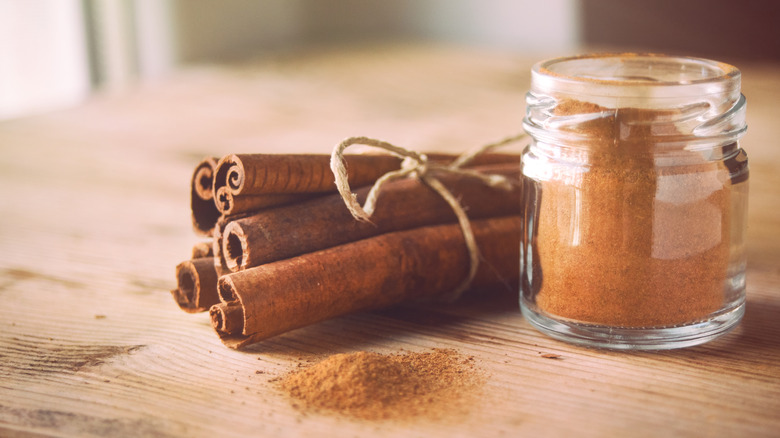Give Your Lawn A Boost With A Kitchen Spice That Promotes Healthy Growth
Many homeowners work hard all year long to maintain a healthy lawn and face the question of whether to use chemical herbicides, pesticides, and fertilizers to do so. If you have children or pets that frequently play in the yard, the use of chemicals can be especially troublesome. Luckily, there are natural ways you can give your lawn a boost without filling it with potentially harmful chemicals or upsetting the balance of your backyard ecosystem. And some of them are hiding in your kitchen cabinet, including cinnamon.
You can use cinnamon on your lawn to prevent common plant diseases, deter pests, and keep fungus away. It's not going to get rid of mushrooms in your yard, but research shows it can be effective in preventing new mushroom growth. Cinnamon also promotes healthy grass growth, which can help improve the appearance of your lawn if you have issues with patchy growth. You can sprinkle cinnamon bark powder in problem areas to promote healthy growth or treat the entire lawn as a preventative measure. Alternatively, you can spray a mix of cinnamon essential oil or extracts and water. You can also boost the effectiveness of cinnamon oil against fungi by combining it with clove oil.
How cinnamon acts as organic fungus prevention
Cinnamon is one of many common kitchen ingredients you can use for DIY pest control by deterring ants and mice. It has been widely recognized for the health benefits it provides from human consumption, but few gardeners are aware that it can provide similar benefits for plant health. It isn't generally used to kill existing pests, mold, or fungus, but rather as an organic herbicide to prevent future issues. The antifungal, antimicrobial, and phytotoxic effects paired with beneficial components such as antioxidants work together to promote plant health, making it an effective alternative to fertilizer in your lawn. Cinnamon's ability to prevent fungus means seedlings stand a better chance of flourishing, and it can also protect the roots of new plants against common diseases that might otherwise kill them.
Research about the benefits of cinnamon in organic gardening is ongoing, but it is a current candidate for an approved alternative to chemical pesticides. This is largely attributed to the potential it has to prevent pests from laying eggs in areas where it has been spread. In addition, it has been proven to prevent fungal growth as well as certain types of powdery mildew that impact plants. Many gardeners also swear by cinnamon's ability to combat mold growth on their plants.

